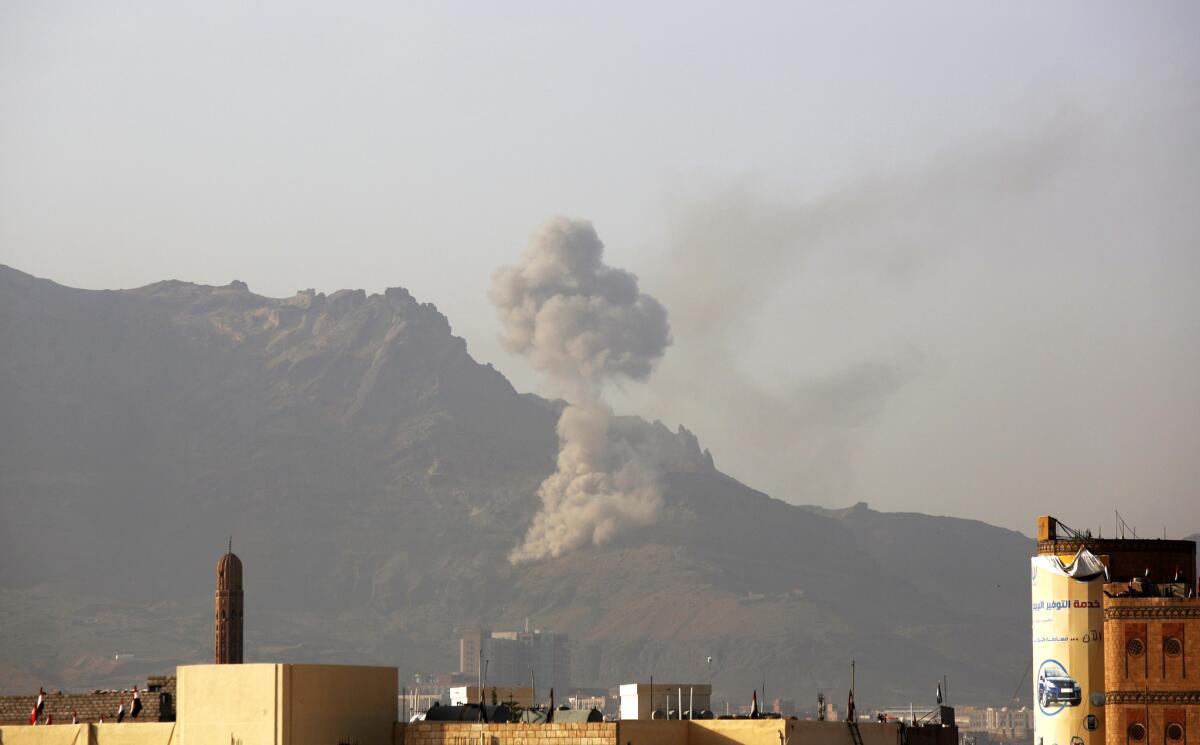Al Qaeda reportedly executes 2 accused spies in Yemen after U.S. attack

Smoke rises after a Saudi-led airstrike hit a site believed to be one of the largest weapons depots on the outskirts of Yemen’s capital, Sana, on Wednesday.
- Share via
reporting from Sana, Yemen — The retribution was gruesome — and not long in coming.
A day after Al Qaeda’s affiliate in Yemen confirmed the death of a former senior lieutenant of Osama bin Laden in an apparent U.S. drone strike, online images surfaced of two accused “spies,” purportedly in advance of their executions, and two bodies subsequently were shown hanging from concrete overpasses.
Witnesses in the southern Yemen city of Mukalla, which is under the control of Al Qaeda in the Arabian Peninsula, or AQAP, said two men were publicly shot after being denounced for providing information that led to the death of Nasir Wahishi. Wahishi was described as Al Qaeda’s No. 2 leader worldwide and was head of the organization’s Yemen franchise.
In online photographs posted Wednesday on social media and Yemeni news sites, two men were pictured on a beach, one kneeling with his head down and the other seated cross-legged, appearing to argue with his captors. Separate photographs posted later showed two corpses splayed crucifixion-style and hanging from overpasses.
It could not immediately be established whether the photos depicted the same men.
The Al Qaeda organization in Yemen, one of the group’s most feared and lethal branches, announced Wahishi’s “martyrdom” on Tuesday, days after the strike that killed him. The White House confirmed his death, calling Wahishi an “experienced terrorist leader.”
The port city of Mukalla, Yemen’s fifth-largest, fell to Al Qaeda in April, amid chaotic fighting elsewhere in the country between Shiite Muslim Houthi rebels and forces loyal to exiled President Abdu Rabu Mansour Hadi. The AQAP militants looted the town’s branch of Yemen’s Central Bank and set hundreds of prisoners free.
One of the men executed in the apparent revenge killings for the drone strike was identified in online postings by Al Qaeda loyalists as a Saudi citizen, and the second was believed to be Saudi as well, the Associated Press reported.
Al Qaeda quickly announced the appointment of a replacement for Wahishi, identified as Qasim Raimi, according to jihadist forums.
A Yemeni expert on Islamist groups, Saeed Obaid Jamhi, said the highly public executions of suspected spies was likely seen as a crucial means of retaining the organization’s prestige. He predicted that major attacks also would be attempted to avenge Wahishi’s death.
Yemen’s Al Qaeda branch, long targeted by U.S. drone strikes, has taken advantage of months of fighting in Yemen to cement its own territorial gains. From its Yemen base, AQAP claimed responsibility for the deadly January attack on the French satirical weekly Charlie Hebdo, and in the past has repeatedly attempted attacks on other Western targets.
Elsewhere in Yemen, medical officials said airstrikes by the Saudi-led coalition seeking to restore Hadi to power struck a civilian convoy outside the port city of Aden, killing more than 30 people.
And at dusk, at least three explosions shook the capital, Sana, apparently targeting mosques and causing an undetermined number of casualties.
U.N.-backed consultations aimed at bringing at least a temporary halt to the fighting were underway in Geneva, although the warring parties are not in direct contact with one another.
The Muslim holy month of Ramadan begins Thursday, and international organizations appealed again for a humanitarian truce. A previous five-day lull allowed the delivery of some limited stocks of desperately needed food and medicine.
At least 2,500 people, many of them civilians, are estimated to have died in fighting and airstrikes since the end of March. Four-fifths of Yemen’s population of 25 million is now in need of aid, the United Nations has said.
Children in particular have been hit hard by outbreaks of disease, including dengue fever, and those with chronic medical conditions are dying for lack of care, humanitarian groups say.
Special correspondent Al-Alayaa reported from Sana and staff writer King from Urfa, Turkey. Special correspondent Amro Hassan in Cairo contributed to this report.
Follow @LauraKingLAT on Twitter for news from the Middle East
More to Read
Sign up for Essential California
The most important California stories and recommendations in your inbox every morning.
You may occasionally receive promotional content from the Los Angeles Times.










